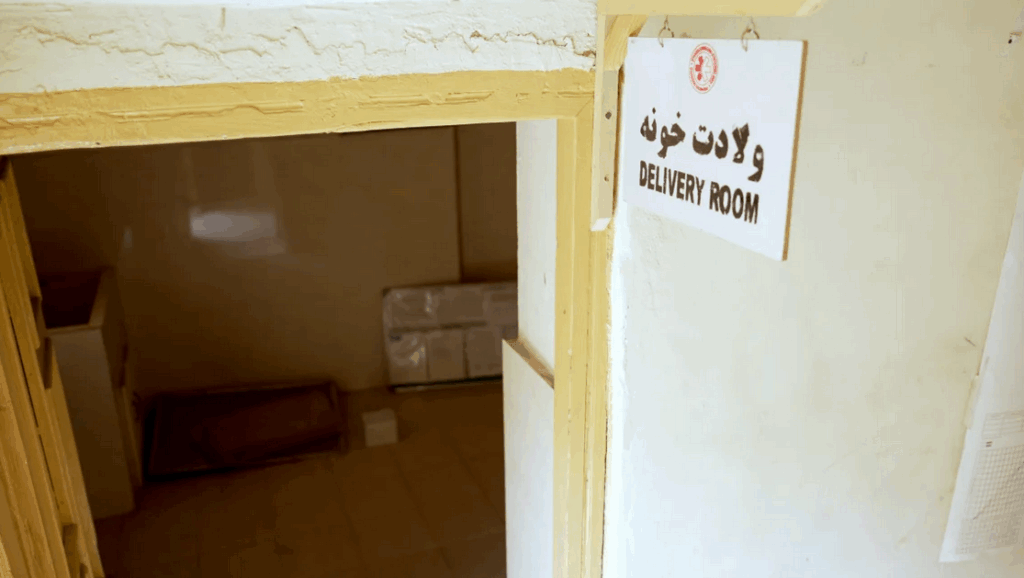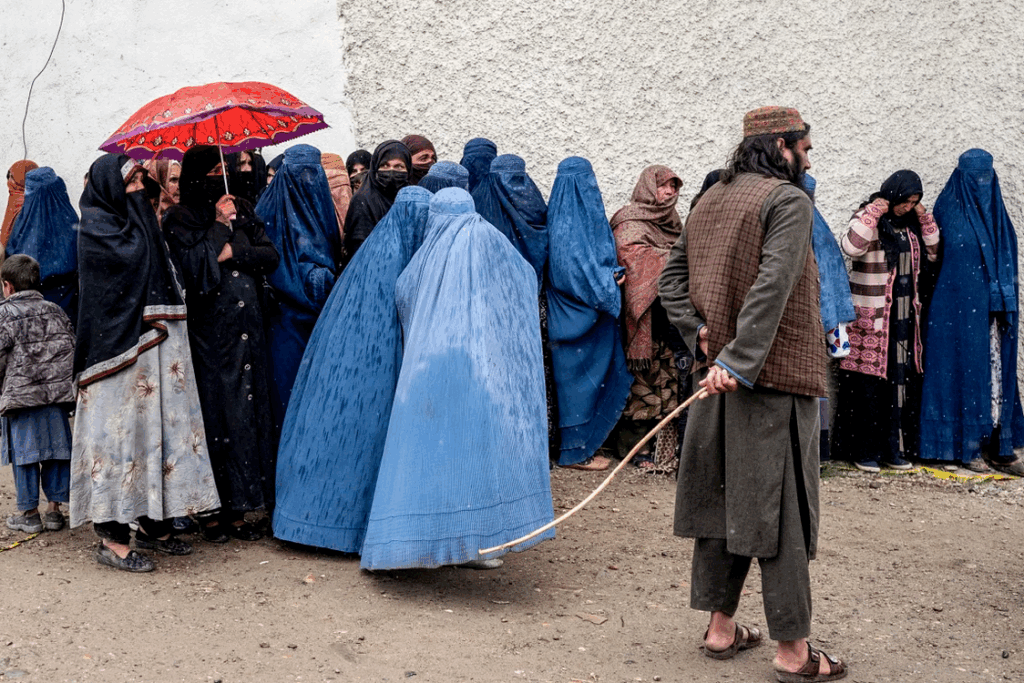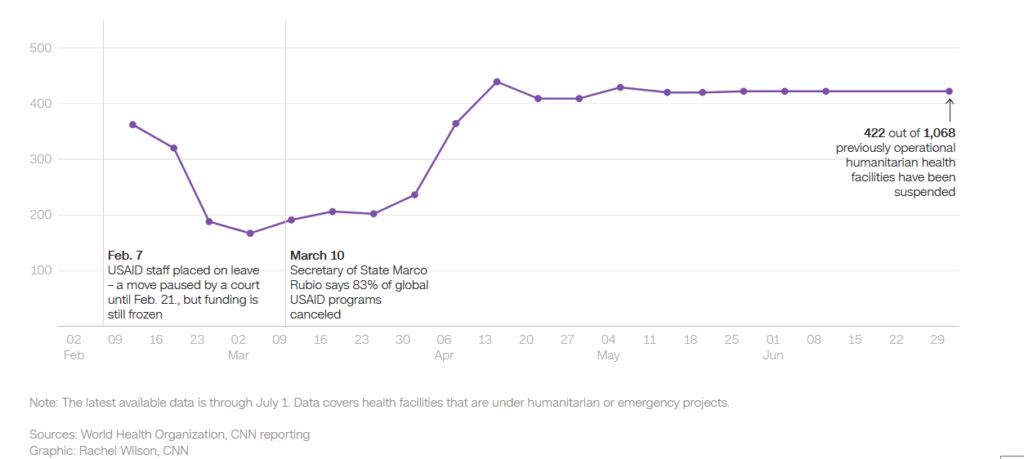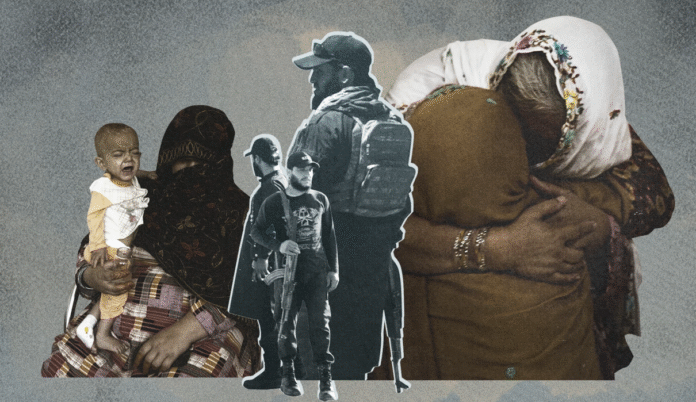The wail of a woman in a floral dress reverberates through the malnutrition ward and down the stuffy hallways of a hospital in eastern Afghanistan: The unfiltered pain of a mother watching her 1-year-old son die.
Families huddle on nearby beds, hugging their children a little tighter as they watch the mother crumple to her knees, clutching the motionless body of her baby.
Mohammad Omar had been plagued with medical problems since birth. And it is impossible to tie any one death definitively to aid cuts. But food and medical shortages – exacerbated by drastic United States humanitarian aid cuts in recent months – may have quickened his decline.
The US government had been funding doctors, midwives, and nurses at the Nangarhar Regional Hospital, where Mohammad died. It also donated medicines and medical equipment, the Nangarhar Public Health Ministry told CNN. All of that was suspended earlier this year.
Dr. Anidullah Samim, a pediatrician on duty in the Nangarhar Regional Hospital at the time of Mohammad’s death, told CNN that the mortality rates of babies there have increased by 3 to 4% since US funding cuts took effect.
This is in part because patients must now cover the costs of their own medicines (something many are unable to afford) and because the closure of hundreds of clinics across the country has forced people to travel further distances to hospitals, which health workers say are overrun and under-resourced.
The neonatal ward here crams three babies into a single crib. Every room is crowded with families, fanning themselves in the stifling heat as they wait for their children to be seen.
Four years on from the chaotic withdrawal of American and NATO troops, Afghanistan is struggling to stay afloat. Only a single country – Russia – has recently recognized the Taliban’s government as legitimate, and the economy has crashed.
The recent termination of over $1.7 billion worth of American aid contracts supporting dozens of programs in Afghanistan – of which around $500 million had yet to be disbursed – is having a devastating impact on Afghan people. America’s cuts were quickly followed by cuts to overseas aid budgets by other countries such as the United Kingdom, France and Germany.
Afghanistan has received close to $8 billion in humanitarian funding over the past four years, according to the UN. Since the Taliban takeover in 2021, the US says it has contributed nearly half of that, mostly through the US Agency for International Development (USAID) – donations which many considered a moral duty, following two decades of American war.
But President Donald Trump has repeatedly stated that US foreign spending should be closely aligned with his “America First” approach and, earlier this year, Elon Musk bragged about “feeding USAID into the wood chipper.” The agency officially closed its doors this month after canceling thousands of humanitarian programs across the world.
US Secretary of State Marco Rubio has repeatedly stated that no one has died because USAID has been shuttered. “Foreign assistance programs that align with administration policies – and which advance American interests – will be administered by the State Department, where they will be delivered with more accountability, strategy, and efficiency,” he wrote in a Substack post this month.
The United States was the largest humanitarian donor to Afghanistan
In 2024, the US government accounted for around 43% of total humanitarian funding received by Afghanistan. It contributed nearly as much as the next 10 largest donors combined, with close to 90% of its aid delivered through the US Agency for International Development (USAID). But dozens of US aid programs have now been cut.

According to the US Special Inspector for Afghanistan Reconstruction (SIGAR), among the programs cut were those for emergency food assistance and maternal and child healthcare.
Though Rubio asserts that the US will continue to administer aid in a “more efficient” manner, most of these global contributions have not been reinstated.
Researchers from the Lancet medical journal estimate that more than 14 million people will die over the next five years because of these cuts. Nearly five million of those are expected to be children younger than 5.
‘More and more women are going to die’
In Afghanistan, millions of people stand to lose out from aid cuts. The Taliban have downplayed the potential impacts, saying their government is well equipped to manage the situation through domestic policies and resource development.
“The country’s budget has a domestic basis,” Taliban spokesperson Zabiullah Mujahid said in a statement in January. “It has nothing to do with the arrival or absence of foreign aid.”
The Taliban rejected multiple requests for an interview.
The US State Department did not respond to CNN’s request for comment, but has insisted that America remains the most generous nation in the world. “We’re by far the most generous nation on earth on foreign aid,” Rubio told Congress in May. “At the same time, it’s got to forward our national interest, and it cannot be throwing away taxpayer money.”

Reporting from Afghanistan comes with its challenges: not least, gaining permission from the ruling Taliban government’s Ministry of Foreign Affairs. But on a recent trip to the country, CNN was able to see just how critical the collection of programs previously funded by USAID were for Afghan people, the vast majority of whom live in desperate poverty.
These include demining efforts; online and underground education programs for girls (under Taliban rules, females over 12 are still not permitted to attend school); skills-based work programs for women; agricultural development; cash and food handouts; and healthcare.
“It’s absolutely devastating,” said Samira Sayed Rahman, advocacy director for Save the Children Afghanistan, of the loss of US aid as she entered what was until just a few weeks ago a small, but functioning, American-funded clinic in Nangarhar province. All that remains now is a dusty delivery room and an empty waiting area. Whatever was left of the medicines for common conditions like malnutrition and sepsis has all been looted, she said.
“When you have suspensions and terminations in US programming that result in clinics like this shutting down, it means these communities don’t have access. It means that women are going to be giving birth at home. Meaning more and more children are going to die during childbirth,” she said. “More and more women are going to die as a result.”
Afghanistan has long had one of the highest maternal mortality rates in the world. The United Nations Population Fund (UNFPA) estimates that an Afghan woman dies every two hours from pregnancy, childbirth or its aftermath from causes that are largely preventable with skilled care.
A community elder near the closed Nangarhar clinic told CNN that at least seven people have already died since this single facility shuttered its doors. One woman passed away just a couple of days before our visit, the elder said. After following up on her case, CNN learned that – unable to travel to a medical facility – both she and her baby died during childbirth at home. Her family believe that she would have survived had she had a midwife by her side, at the village’s former clinic.
Women are particularly vulnerable; their circumstances only made worse by the Taliban’s rule, which has stripped away many of their rights and almost erased them from public life.

Under the Taliban’s strict interpretations of Islamic law, or sharia, women must veil their bodies and wear face coverings in public, are forbidden from traveling long distances without a male chaperone; cannot work in most public (and many private) spaces; cannot enter parks, gyms or salons; and cannot raise their voices in public.
Earlier this month the International Criminal Court sought arrest warrants for two of the top Taliban leaders, citing the persecution of women and girls as evidence of crimes against humanity.
The Taliban called the arrest warrants “nonsense,” writing in a statement that the group does not recognize the ICC.
‘She was crying all the time’
Over the course of several weeks, CNN spoke with over a dozen women and girls from throughout the country who say they have been directly impacted both by the USAID cuts and the Taliban’s stifling restrictions. They were reluctant to speak for fear of repercussions from the Taliban, who have spent years consolidating their power and increasing surveillance of citizens.
“There was a clinic here, but it’s closed now. Women can’t leave the house alone,” explained a woman in Takhar province, whom CNN is calling Negar. “I waited for my husband to come home from farming and take me to the (nearest) clinic. There is no clinic near us. My babies who were miscarried were full-term, and I had to deliver them. They were twins.”
CNN was able to verify the location of a clinic Negar said had recently closed – and that she believes could have saved her babies had she been able to access it. It had been funded by USAID but closed when money was cut.
In northern Afghanistan, a psychiatrist in her 20s had her salary paid by USAID for the last few years but is now without a job. She found her work fulfilling – and recounted the story of a young girl whom she had been counseling for several months.
“She was suffering from deep depression. She was crying all the time, crying so much that my heart ached,” the psychiatrist said. She told CNN that with regular therapy and a prescription for antidepressants, her young client’s outlook gradually started to improve. That ended abruptly in March, when US funding was cut, and the psychiatrist lost her job – as did many other NGO workers. The girl’s counseling and prescription were suddenly canceled.
Several months later, and unable to visit her client, the psychiatrist called the girl’s neighbors and asked how she was doing. “But they told me with great sadness that she had (died by) suicide a few days ago and passed away.” She blames the US aid cuts both for her client’s death and her own mental decline. “The cutoff of US aid caused this. Now I am sitting at home unemployed… I became depressed too,” she said.
Around 40% of Afghanistan’s humanitarian health facilities have been forced to close or suspend operations following US aid cuts
In February, the Trump administration froze foreign aid and began dismantling USAID. The move has hit Afghanistan’s health sector hard. Despite efforts by some NGOs to keep facilities open through other funding sources, many of these arrangements did not last. By April, the number of suspended facilities increased.
Number of closed or suspended health facilities in Afghanistan since mid-February

US ‘cannot be the world’s bank account’
The total abolishment of US funds entering Afghanistan has long been in the works. Republican Congressional Representative Tim Burchett has for years been spearheading his “No Tax Dollars For Terrorists Act,” which passed the House of Representatives in June and will head next to the Senate.
Burchett claims that at least $40 million per week of American taxpayers’ money has been ending up in the hands of the Taliban, who are categorized by the US as Specially Designated Global Terrorists.
The truth is more nuanced. The US government’s own watchdog, SIGAR, was able to track $10.9 million going to the Taliban-run government between August 2021 and May 2023, in the form of taxes, fees, duties and utilities. The total figure is likely to be higher, though nowhere near the figures that Burchett cites.
“I’m not even sure why we’re sending a penny to Afghanistan. America cannot be the world’s bank account,” Burchett told CNN. “We have Americans in the same position. We have Americans that are having trouble with childbirth. We had Americans going hungry. And you want us to borrow money and send it overseas… I have a lot of sympathy for (Afghan) people. But I think it’s time for their people to rise up and put the form of government they need in there and not the Taliban.”
Back in the Nangarhar Hospital, a midwife silently wraps baby Mohammad’s body in white cloth and removes him from his mother’s sight. More families have trekked for miles in the hope that their children will be saved. Another midwife arrives and replaces the sheets on the bed in which he’s just died, making room for the next sick child.
DISCLAIMER: The Views, Comments, Opinions, Contributions and Statements made by Readers and Contributors on this platform do not necessarily represent the views or policy of Multimedia Group Limited.
DISCLAIMER: The Views, Comments, Opinions, Contributions and Statements made by Readers and Contributors on this platform do not necessarily represent the views or policy of Multimedia Group Limited.


